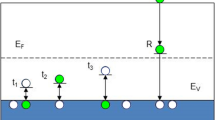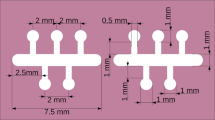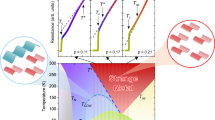Abstract
DURING some work here on the relation between the conduction and emission mechanisms in the oxide cathode (assumed an excess electronic semi-conductor) we have come across slow but marked fluctuations in the values of both currents when these were measured simultaneously for certain values of the field applied to the anode. Further, over the range of temperature explored, a threshold at about l,100°K. was indicated, which is well above the temperature at which ‘p’ type conduction has been suspected; generally, the current fluctuations become more and more compensatory in the sense that an increase in one occurs simultaneously with a decrease in the other, till at l,250°K., the marked field periodicity shown in the diagram takes place. Above this temperature, the fluctuations are much larger for certain field values and the correlation less pronounced, but the general character of the form of the curves is maintained.
This is a preview of subscription content, access via your institution
Access options
Subscribe to this journal
Receive 51 print issues and online access
$199.00 per year
only $3.90 per issue
Buy this article
- Purchase on Springer Link
- Instant access to full article PDF
Prices may be subject to local taxes which are calculated during checkout
Similar content being viewed by others
Author information
Authors and Affiliations
Rights and permissions
About this article
Cite this article
CHISHOLM, M., JACOB, L. Current Fluctuations in the Oxide Cathode. Nature 184, 1058–1059 (1959). https://doi.org/10.1038/1841058a0
Issue Date:
DOI: https://doi.org/10.1038/1841058a0
Comments
By submitting a comment you agree to abide by our Terms and Community Guidelines. If you find something abusive or that does not comply with our terms or guidelines please flag it as inappropriate.



